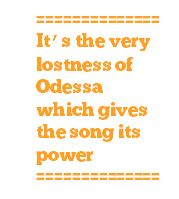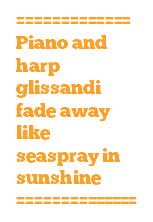No. 8 in Top 50 Bee Gees’ Songs 1966-72
By Barry, Robin & Maurice Gibb
Lead Vocal: Robin
Album: Odessa 1969
“Can’t seem to leave the sea anymore”
Odessa (City on the Black Sea) is a song about the survivor of the fictitious British ship ‘Veronica’, floating on an iceberg in the Baltic Sea… or is it?
We are told that ‘Captain Richardson left himself a lonely wife in Hull’ and that she finds solace in the vicar’s prayers. Yet references to ‘sailing around in the North Atlantic’, moving to Finland and indeed to Odessa itself, on the face of it, obscure a coherent story. Yes the geography is vague but it doesn’t matter. It’s the very lostness of Odessa which gives the song its power.
Heartbroken loneliness
Odessa is essentially about a heartbroken loneliness which seems to stretch on forever. The story is told ostensibly from the Captain’s point of view but at times it’s as if he is almost able to somehow see or, at least, imagine, the life now led by his wife back home. He claims ‘you love the vicar more than words can say’ and he appears to know about the neighbours who ‘haven’t got their dog anymore’. These seem like speculations born out of longing or it’s as if his love  is so strong that it is able to sense his wife at so great a distance. I think this gives ‘Odessa’ a kind of subtle, ambivalent yet piercing quality which hints at the psychic without ever making it explicit.
is so strong that it is able to sense his wife at so great a distance. I think this gives ‘Odessa’ a kind of subtle, ambivalent yet piercing quality which hints at the psychic without ever making it explicit.
Cold gaze of history
Yet perhaps the true point of view is not any one person’s but the cold gaze of history and of fate itself. The identical lyrical bookending of the song emphasises this – ‘Fourteenth of February, eighteen ninety nine, The British ship Veronica was lost without a sign’. It ends just as fatefully as it began.
To label Odessa a mere ‘song’ seems too modest given its obvious ambitiousness, orchestral grandeur and deployment of integral extended instrumental passages, not to mention its unprecedented  length (7.33).
length (7.33).
Everything about the way in which the listener approaches Odessa reinforces this sense of the epic. It is the first and title track on the Bee Gees’ first (and only) double-album, a lavish gatefold sleeved affair bearing gold embossed lettering upon red flock velvet. An opening stereo sweep and intoned narrative chant immediately signal a new direction. ‘Odessa’ is the Bee Gees flexing their songwriting prowess and responding to the progressive mood of the times.
Yet they don’t try to emulate what others were doing. In its songcraft, melody, emotionality and lyrical weirdness, Odessa is quintessential Bee Gees through and through yet it stands as the highpoint of their early period baroque ambitions – a poetic, progressive yet steadfastly ‘unrock’ quasi-operatic magnum opus.
Tide of strings
The orchestration is lush and the overall sound expansive but the arrangement remains both sensitive and original. The highly unusual combination of Maurice’s flamenco guitar and Paul Buckmaster’s sturdy ‘cello are central. Tinkling, heavily reverbed piano and harp glissandi seem to almost fade away like seaspray in sunshine and there are nice touches like a lost misty flute near the close (or is that Maurice’s mellotron?). Vocal harmonies wail and then soar majestically during the slow choruses against a tide of strings.
Attention is paid to detail such as Robin’s drier vocal during verse two with its ‘neighbours’ lyric so that the breakout into the heavily reverbed widescreen ‘Odessa’ chorus is allowed full emotional impact. It is as if the Captain has broken out of a futile attempt at homely reassurance to reveal his inner desperation: ‘Odessa, how strong am I?’
Another nice detail: ‘Russian’ bass chants are introduced only in the lead-up to the song’s close as if to emphasise the story ending on a grave note.
Ghostly, siren clarity
When you hear the mono demo version, (made available with the Rhino re-issue) the bones of the song are laid bare. Yet even with a much reduced orchestra it possesses that beguiling emotional spell. Vocals take centre stage carried by mellotron and acoustic guitar.  Contrasting ‘cello/guitar passages provide an understated maritime mood. The overall feel is sparser, looser, more organic, the tempo seems less rigid, the pace slower, statelier. Without the orchestra, the emotional effect is one of unadorned, aching loneliness, more akin to one of Robin’s vignettes. The melodrama and cinematic sweep have gone and the emotional heart is exposed.
Contrasting ‘cello/guitar passages provide an understated maritime mood. The overall feel is sparser, looser, more organic, the tempo seems less rigid, the pace slower, statelier. Without the orchestra, the emotional effect is one of unadorned, aching loneliness, more akin to one of Robin’s vignettes. The melodrama and cinematic sweep have gone and the emotional heart is exposed.
There are several ways in which the finished second version definitely improves upon the original, notably in the opening and closing passages. In the first version, the words are quietly spoken by Maurice whereas in the second version they are intoned, with ghostly, siren clarity, by Robin. And the words themselves have been amended to create a more lyrical feel. The timpani of the first version (cannon fire?) is gone from the second. Timpani struck me as a little too abrupt for the mood of the song.
What the first version doesn’t show is that Odessa started life as a three minute verse-chorus song, later dressed up in a flamboyant orchestral costume. Structurally the ‘cello/flamenco passages are crucial and are there from the start. Narratively, the opening and closing passages are integral. You can’t just begin ‘Odessa’ a bar or two before ‘Cherub…’, it wouldn’t make sense.
Dramatic flourish
I love the dramatic flourish of the album track but I also love the fragile intimacy of the Odessa ‘sketch’. Forced to choose between the two, I’d opt for the second version because it’s the finished one and because that’s the one which made it onto the album. And I wouldn’t want not to hear the magnificence of the finished opus again.
‘Odessa’ makes for an interesting comparison with Procol Harum’s ‘A Salty Dog’, another ambitious masterpiece released the same year also charting an emotional journey through maritime imagery.
